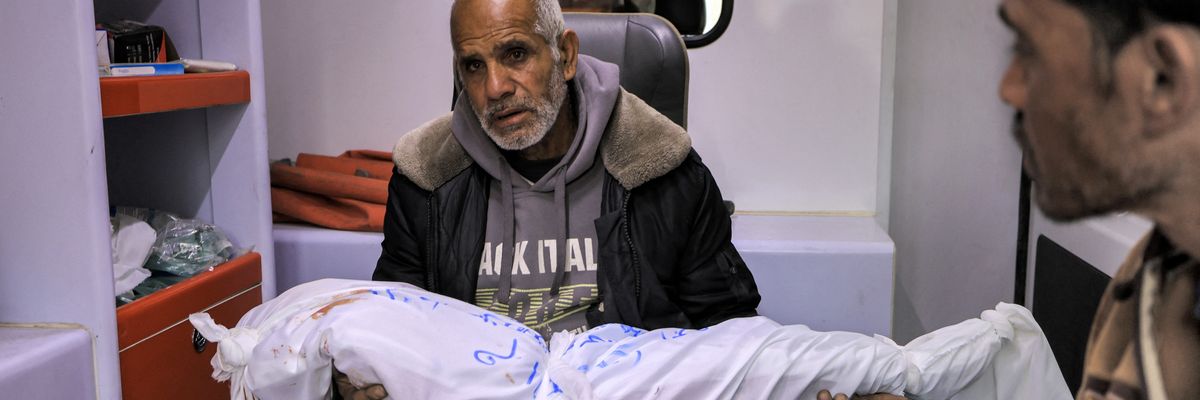The World Health Organization on Tuesday accused Israeli forces of delaying an aid and ambulance convoy and abusing medical personnel as they tried to transfer critically wounded patients to a hospital in southern Gaza, resulting in at least one death.
In a detailed account of what it called a "high-risk mission" conducted on December 9, the WHO said that as the emergency convoy made its way to Gaza's Al-Ahli Hospital to deliver medical supplies and pick up badly injured patients, it was inspected by Israeli forces at a checkpoint and crew members were forced to leave the vehicles.
Two members of the Palestine Red Crescent Society (PRCS), a humanitarian aid group that took part in the mission, were detained for more than an hour, the WHO said, noting that one staffer saw a PRCS worker "being made to kneel at gunpoint and then taken out of sight, where he was reportedly harassed, beaten, stripped, and searched."
When the convoy was finally permitted to advance to Gaza City, one of the aid trucks and an ambulance were hit by bullets.
WHO staff described the scene at Al-Ahli Hospital—one of the few medical facilities still operating in the strip—as "utter chaos and a humanitarian disaster zone."
As the convoy made its way back south with wounded patients, the convoy was stopped again at the same checkpoint, delaying care for critically wounded Palestinians who were searched by armed Israeli soldiers.
"One of the same two PRCS staff temporarily detained earlier on the way in was taken for interrogation a second time," the WHO said Tuesday. "The mission made numerous attempts to coordinate his release, but eventually—after more than two and a half hours—had to make the difficult decision to leave the highly dangerous area and proceed, for the safety and well-being of the patients and humanitarian workers."
According to PRCS, one of the patients aboard the convoy died from untreated wounds during the delay.
"Obstructing ambulances and attacks on humanitarian and health workers are unconscionable."
The WHO said December 9 was not the first time it was involved in an emergency operation that was held up by Israeli forces.
"On 18 November, six people from the Ministry of Health and PRCS were detained during a WHO-led mission to move patients from Al-Shifa Hospital," the WHO said Tuesday. "Four people—three from the Ministry of Health and one PRCS staff—are still in detention, more than three weeks later. There is no information on their well-being or whereabouts. This is unacceptable."
"Obstructing ambulances and attacks on humanitarian and health workers are unconscionable," the U.N. agency added. "Healthcare, including ambulances, are protected under international law. They must be respected and protected in all circumstances."
U.N. experts have condemned Israel's "unrelenting war" on Gaza's healthcare system, which is struggling to stay afloat amid the Israeli military's ongoing bombing campaign and blockade. Israel has bombed and fired on ambulance convoys and medical facilities in Gaza, killing patients and healthcare workers.
The WHO's representative for Gaza and the West Bank, Richard Peeperkorn, said during a press briefing on Tuesday that fewer than a dozen hospitals are still operating in the besieged strip as the number of people wounded by Israeli airstrikes continues to climb. The U.N. Office for the Coordination of Humanitarian Affairs said that between the afternoons of December 10 and 11, at least 416 people were injured in Gaza and 208 were killed.
"In just 66 days, the health system has gone from 36 functional hospitals to 11 partially functional hospitals—one in the north and 10 in the south," Peeperkorn said via videolink from Gaza. "We cannot afford to lose any healthcare facilities or hospitals. We hope, we plea, that this will not happen."
